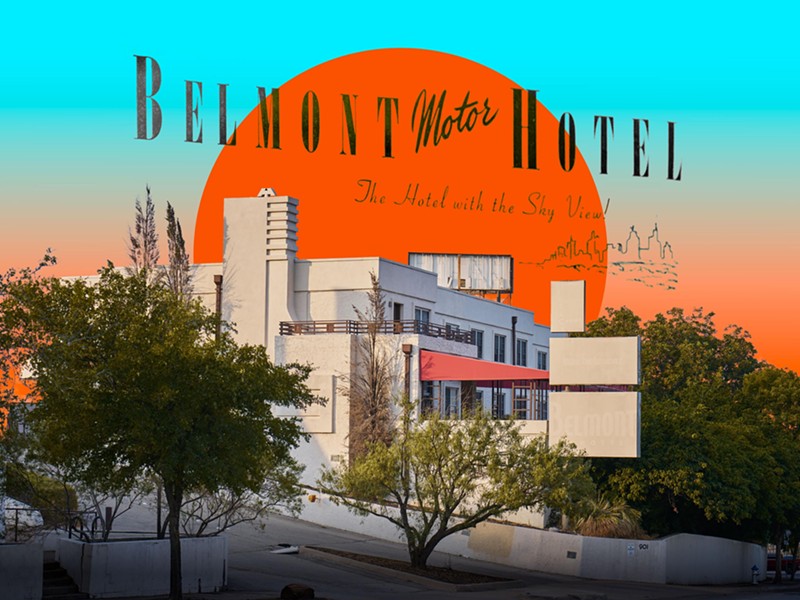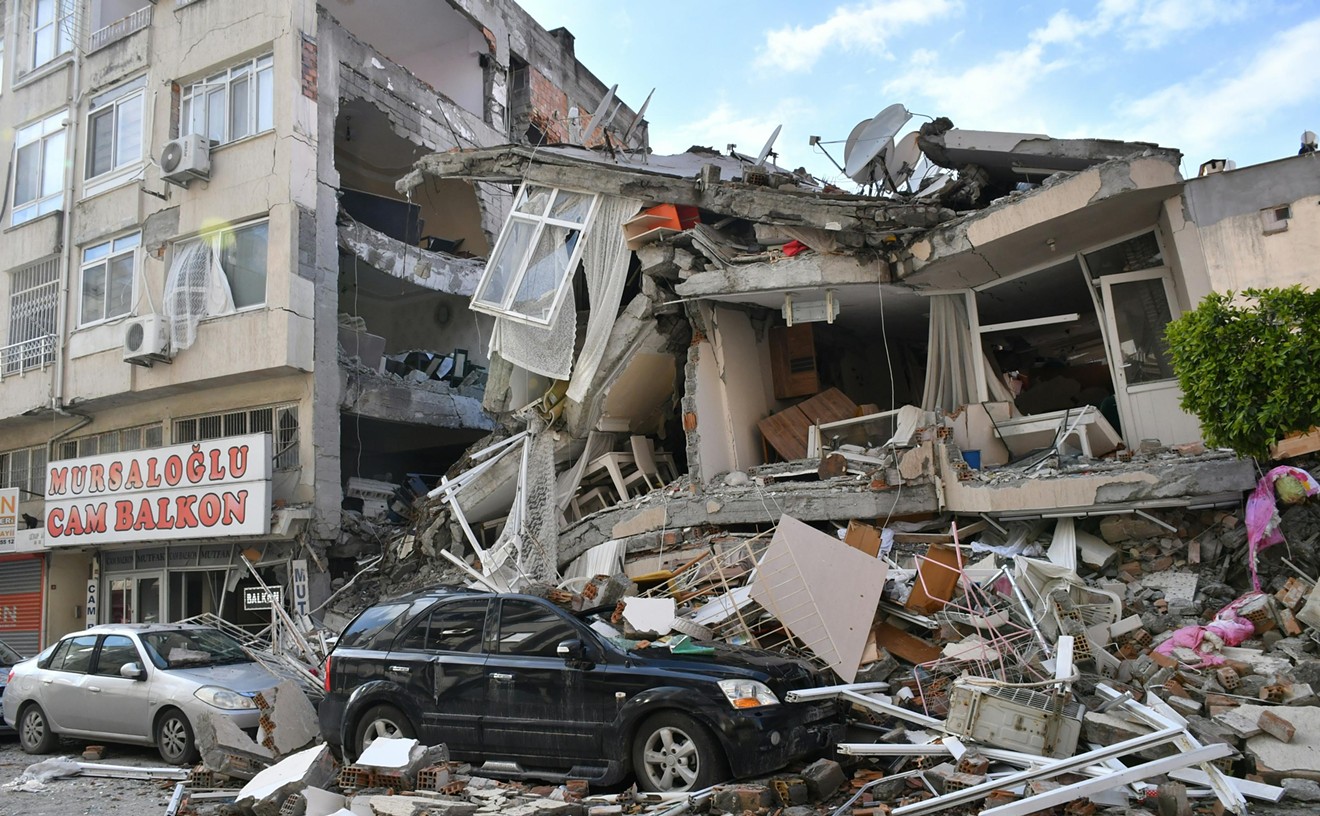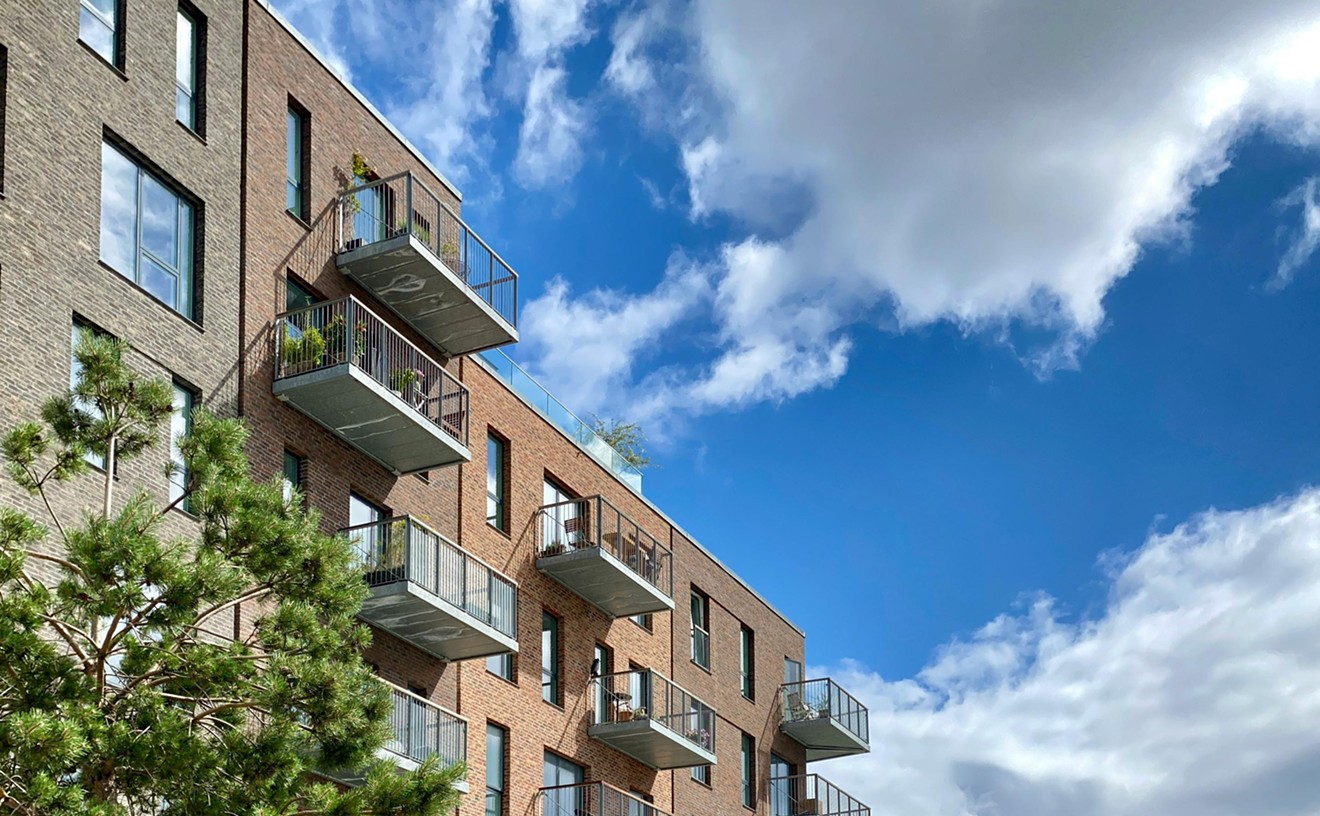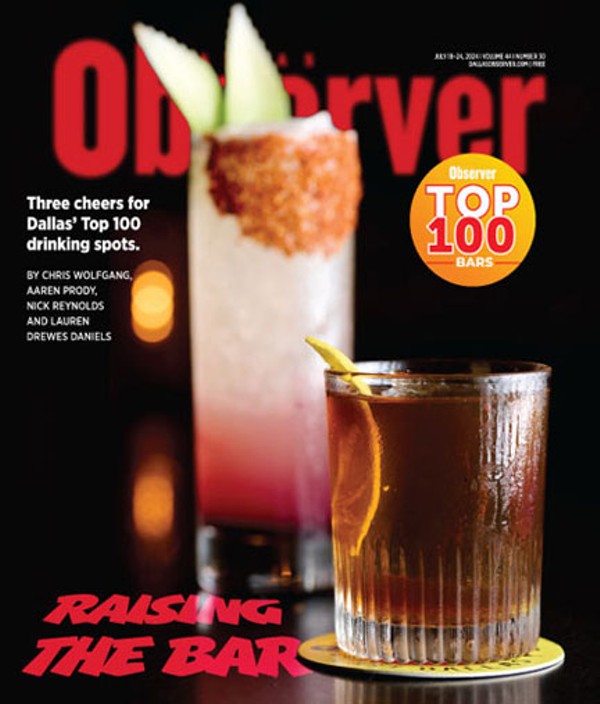The West Dallas motor inn was the only item on the agenda for the city’s Landmark Designation Committee meeting last week. Holed up in the windowless auditorium of the Lakewood Branch Library, advocates for the building’s preservation, committee members, city staff and the hotel’s owner, Jordan Ford, met to parse through a 20-page landmark nomination form and preservation ordinance that took two years to come to fruition.
Ford, flanked by two lawyers wearing wire-rimmed glasses that matched his own, claimed the meeting was the first opportunity he has had to participate in efforts to preserve the Belmont.
The son of Dallas billionaire Gerald Ford, Jordan Ford — alongside hospitality moguls Matt Comfort and Jeff Burns — purchased the Belmont from Monte Anderson, an Oak Cliff developer, in 2015. The cozy hotel had fallen into disrepair in the latter half of the 20th century, and Anderson had painstakingly nursed it back to health for over a decade. It wasn’t for sale when Ford, Comfort and Burns came along, but the trio said “all the right things,” Anderson said.
By early 2019, Ford, Comfort and Burns had a falling out, and the hotel was left with Ford. In the time since, the five-building complex was shuttered because of COVID-19 and has yet to reopen. And though COVID played a significant part in the Belmont’s initial closing, many blame Ford for the building’s current dilapidated condition.
“I had hoped that they would be better than us, but I saw very quickly that I had made a mistake,” Anderson told the Observer. “These guys, they don’t care. They have plenty of money to do a good job. To do something special here. And they just don’t care.”
A Remnant of Dallas Past
Before the completion of Interstate 30 in 1957, it was Fort Worth Avenue that served as the road to the west.Capitalizing on the traffic coming into Dallas from Fort Worth, hotel proprietors began investing in motor inns — hotels where rooms sat adjacent to carports or parking areas — along the only corridor connecting the two cities. The Belmont was part of that trend. Designed by the iconic Dallas architect Charles Dilbeck, it had managed to maintain its cultural relevance well past the days of the drive-up hotel.
Dilbeck’s name being attached to the Belmont would be reason enough for some dedicated Dallasites to support it. The architect originated his residential design business in Tulsa before moving to the Park Cities in 1932. Today, he is revered with a “mythic, cult-like” following, said Willis Winters, the president of Preservation Texas and a board member of the Dilbeck Architecture Conservancy.
“These guys, they don’t care. They have plenty of money to do a good job. To do something special here. And they just don’t care.” – Monte Anderson, developer
tweet this
Groups like the conservancy are dedicated to promoting and preserving Dilbeck’s work, which is sprinkled across the country and concentrated in Dallas. His style is known for being quirky and whimsical, something he especially honed after World War II when he graduated out of the residential market and into commercial architecture.
“[Dilbeck] could have done six or seven different motor hotels in Dallas, and unfortunately they’re all being demolished over the years,” Winters said. “I would describe the Belmont as majorly at risk, because it’s been allowed to deteriorate substantially.”
The Belmont, which opened in 1947, is made up of five white, single-story buildings that bubble and bulge as if stucco had been erroneously dropped from the sky. The number of rooms has drifted between the mid-60s and mid-70s over the hotel’s 77-year history. A restaurant, bar and trendy pool helped the hotel develop its here-for-a-good-time reputation early on, and the limestone bluff the hotel sits atop solidified it as an icon of the region.
It’s a piece of Old Hollywood, drifting over West Dallas like a smattering of clouds.
As a child, Anderson remembers feeling there was an air of mysticism surrounding the hotel. He and his dad regularly ate at the Hungry Bear, the Belmont’s original restaurant, and the hotel was “an anchor” for the surrounding Oak Cliff and West Dallas communities, which had yet to be touched by the unforgiving hand of Dallas overdevelopment. So, when the property came into his possession in 1999, Anderson was “highly, personally involved.”
From the get, there wasn’t enough money. Much-needed renovations took place one room at a time.
“It was painfully slow,” Anderson said. “At night I sat up on top of the hill and guarded the place, because we couldn’t afford security at the time, to keep people from stealing the TVs.”
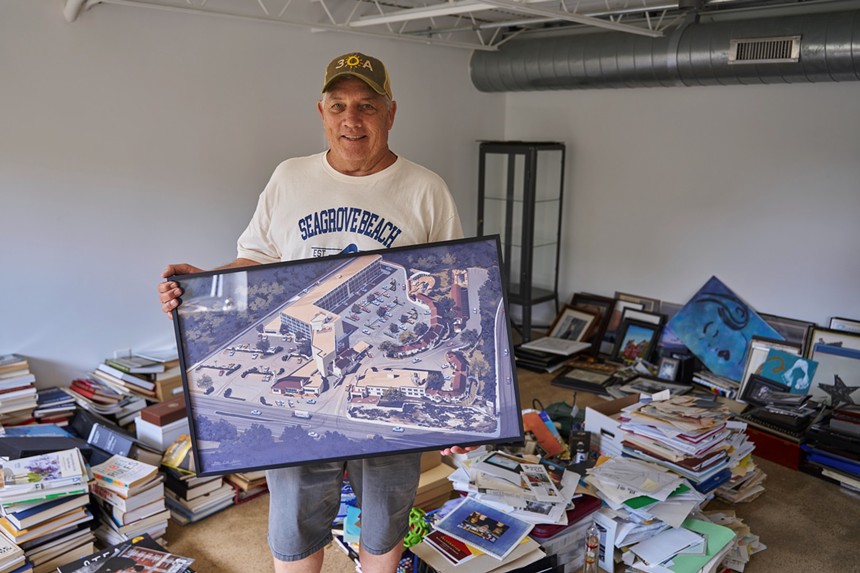
Monte Anderson revived the Belmont to its former glory once, but the current owner didn't accept his offer of help more recently.
Christopher Durbin
Under Anderson, the Belmont qualified for federal historic tax credits, which are designed to help pave the financial path for major preservation projects. The money helped, but the program’s particulars about maintaining historical accuracy posed challenges. For instance, the guidelines specified maintaining the building’s original materials, such as aluminum windows, which simply would not work with modern energy codes, Anderson said.
Already, everything was “so hard” to manage, so Anderson declined to initiate a Landmark Designation process for the building. Now, he wishes he had.
Saving the Hotel on the Hill
Designating a building as historic can be an unexpectedly tedious process.When a new building is nominated, the city’s designation committee reviews the application and makes recommendations that are forwarded to the landmark commission. Once the Landmark Commission has added their two cents, the project is sent to the City Plan Commission, where the documents are combed over once more before being completed by the City Council. From the time a building’s designation is initiated, it is protected from demolition for two years as the process is underway. Once the two years expires, and if the preservation ordinance hasn’t been ratified, anything is fair game unless the process is reinitiated.
The path to the Belmont’s preservation has been exceptionally complicated.
For starters, preserving the hotel was initiated in 2019, but efforts stalled out because of COVID. They were picked up again in the summer of 2022, but not by Ford. It was the City Plan Commission that instructed the designation committee to take a look at the hotel, and a year ago commissioners began to bring attention to the ticking clock on the Belmont’s case.
There was also confusion on the city’s end about who actually was involved with the hotel. It was widely reported across Dallas media last summer that the local real estate developers Todd Interests had signed onto the Belmont. They had a master plan for the site, which representatives walked Daron Tapscott, chair of the designation committee, through last year. Tapscott said he was under the impression the Todd Interests guys were the right ones to be working with.
Information from that site walk was used to write the landmark nomination form and preservation ordinance — outlining everything from acceptable concrete types to no-build zones — that was approved by the designation committee last month. But when the recommendations were presented to the Landmark Commission on July 1, a slightly disheveled Ford stood before the quasi-governing board. He said he’d never been made aware of the current process to preserve the building, and many of the designation committee’s recommendations contradicted his design plans for the property.
Todd Interests was no longer involved with the property, he added. He was, and is, the sole representative for the Belmont Hotel.
“I can’t make any crystal ball predictions.” – Jordan Ford, owner, The Belmont
tweet this
In an interview with the Observer, Ford said he felt “disheartened” to learn he’d been left out of the designation process, because he felt he’d developed a relationship with a number of Dallas city staff members during the 2019 attempt. Talking with architects and other preservation-minded professionals, he was told it was unusual for a city to “just go after” a property.
“[Ford] should’ve been contacted, in my opinion,” David Preziosi, who sits on the designation committee and the Landmark Commission, told the Observer. “You want to have the owner on board with the designation; otherwise, it’s harder to get the designation through.”
Ford told the city he received a notice when the designation process was initiated, but didn’t understand what it was for. He also says he had no knowledge of Todd Interests’ involvement in aiding with the designation report. The partnership fell apart for financial reasons, Ford said.
Winters was as shocked to learn that Shawn Todd, the founder of Todd Interests, had pulled out of the Belmont project as he was to hear Ford had no knowledge of the designation committee’s process being well underway. The whole thing, he says, is “mind-boggling.”
“[The Belmont] was a legitimate effort on Shawn’s part, and I was disappointed that he was not able to move through that with the current owner,” Winters said. “That was very surprising, bordering on stunning, that that project did not move forward. Because if anyone could save the Belmont, it was Shawn Todd.”
Todd Interests declined the Observer’s request for comment.
City attorneys say that because meeting notices are public record, the city’s only obligation is to notify property owners when a designation process has been initiated. What’s more, the city is legally allowed to move forward with a designation without the property owner’s consent if approved by a three-fourths vote of the Landmark Commission.
As a show of good faith, Preziosi moved to send the report back to the designation committee to give Ford a meeting to advocate for any amendments he wanted. When Ford arrived at that meeting on July 18, his lawyers presented a thorough breakdown of the document. The ensuing debate, albeit civil, could not be contained to a two-and-a-half hour meeting. The group will have to finish their changes during next month’s designation committee meeting.
In the meantime, the designation process will expire before the report and recommendations have the chance to navigate each of the channels necessary to become law. Ford’s lawyers and city staff are arm wrestling over technical language — like what does decorative really mean when you’re describing ironwork, anyway? — while the whole thing hinges on the City Plan Commission initiating the Belmont’s designation process for a third time in five years.
“If it’s delayed a month to give the owner the chance to read the designation report, I think that’s fair,” Winters said. “[The Belmont] was so well restored by Monte Anderson … To see how far this complex has fallen into dire neglect is really disappointing. I do think everyone is concerned that this is a project that could nearly qualify for demolition by neglect.”
The State of a Crown Jewel
When talking about the Belmont with Ford, you get the sense that he believes all his troubles started with COVID.But in 2019, when the landmark commission began considering a designation for the Belmont, former Dallas Morning News city columnist Robert Wilonsky visited the hotel and noted that it looked “shabby” and “unloved.” The hotel’s longtime anchoring restaurant, Smoke, was out of business by the end of 2018, leaving the dining space empty. Few rooms were booked, and business was down. Simply put, COVID was not the coffin’s first nail, even if Ford doesn’t see it that way.
And while the rest of the world has reopened and recovered — or, if they haven’t, they’ve thrown in the towel — the Belmont Hotel sits vacant.
Ford told the Observer that some criticisms of the building’s state — both Anderson and Winters said they are concerned about demolition by neglect — are unfair. During the pandemic, he dedicated “all of his budget” to the Belmont’s roofs, parapets and sidings to ensure structural integrity. The 2021 Snowmageddon freeze resulted in plumbing issues that “destroyed the interiors of more than half of the rooms.”
“That’s what disrepair has happened,” he said.
During the July 18 designation committee meeting, Ford sat with his brow furrowed and lips slightly downturned. When asked to elaborate on his thoughts he often rubbed his face, as if exhausted. He told the committee he has spent nearly 10 years “trying to figure out what [the Belmont] wanted to be.”
He says he wants people back on the property, but thinks the landmark designation process may be throwing a wrench into his timeline. When we asked if it would be one year, or two, or three, before the Belmont is open once again, he said “I can’t make any crystal ball predictions.”
And, while he admitted to us that he has come to terms with the fact that he might not be the best person for the hefty job, he also said he’s turned down over 30 interested buyers whose vision for the Belmont’s future “didn’t pass the smell test.”
Anderson says, at one point, he wanted back in, but Ford declined.
“I met with Jordan Ford several times … and said, ‘Look, let me help you. I’ll help you for nothing.’ Because I didn’t want to see it wrecked,” Anderson said. “An old property, unattended to, deteriorates fast. …. I suspect they’re going to say they can’t sell it, it’s deteriorating now, so they need to tear it down and sell the land. Build a high-rise or something.”
Ford told the City Plan Commission in 2019, and reiterated this summer, that he has no plans to tear down the Belmont. He has said numerous times over the years that his intention is to reopen the hotel. But it’s difficult, when listening to Ford — a man who seems brimming with ideas and money but has yet to execute on the promises he has made since taking over and struggles to articulate what the path forward looks like — to know what is actually happening at the hotel on the hill. (“With Jordan, sometimes, you have to pull the words out of him,” Suzan Kendron, a land use attorney with Jackson Walker, who is representing Ford during his dealings with the city, told the committee.)
In city meetings, he said he has responded to city notices, such as alerts to fix broken windows or cover graffiti, in a timely manner in his near-decade at the Belmont’s helm. Other promises for major renovations are harder to verify, unless visible from the street, and it has become neighborhood gossip just to see a light on in a room, or to see a person walking through the property.
There have now been multiple iterations of partners with development plans that “didn’t work out” on Ford’s end. There have been multiple attempts to pass an ordinance that would preserve the hotel that fell flat on the city’s end.
And so the Belmont sits, and, like a derelict gambler deep in an insurmountable hole, Ford seems to believe he just needs a little more time before he hits big.

